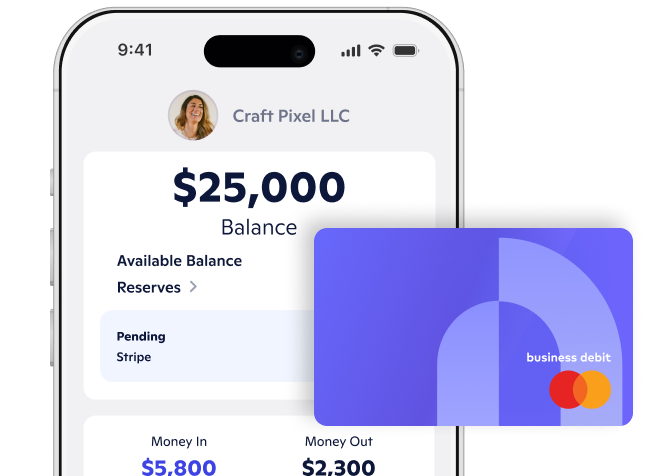
strong business credit score is not just a number; it's a powerful tool that can impact your company's growth and sustainability. Whether you're looking to secure a loan, negotiate better terms with suppliers, or simply gain credibility in your industry, a solid business credit score opens doors and creates opportunities. Read on to learn about business credit tips, from establishing your business credit to ensuring prompt bill payment. These actionable insights will equip you with the knowledge you need about how to boost your business credit score.
Tips for increasing your business credit score
1. Establish your business credit
Establishing your business credit is the foundational step to building a strong business credit score.
One of the first steps is properly establishing your business credit profile separately from your personal finances. After you have established your business as a legal entity, here are some key actions to take:
- Get an Employer Identification Number (EIN): This unique tax ID number helps lenders distinguish your business credit from your personal credit. It only takes a few minutes to get one online from the IRS.
- Get a Data Universal Numbering System (DUNS): Dun & Bradstreet (D&B) assigns these numbers, which establish a business credit file with D&B, one of the three business credit reporting agencies. It's free to obtain a DUNS number but takes up to 30 days unless you pay an expediting fee.
- Open a business bank account: Open dedicated business checking and savings accounts under your company's name and EIN. Avoid co-mingling personal and business funds.
- Get a business credit card: A card in your business's name builds your credit profile. Make sure to use it only for business expenses and pay it off regularly.
- Establish trade lines: Getting lines of credit with various suppliers and vendors builds your business credit history. Make sure they report payment activity to credit bureaus. [https://www.creditstrong.com/business-tradelines/]
2. Pay your bills on time
Just like with personal credit, late or missed payments can negatively impact your business credit score. To ensure prompt payment, consider setting up automatic payments for your regular expenses. This approach ensures that your bills are paid on time, every time, without you having to remember each due date. Alternatively, using accounting software can provide reminders and even automate payments, further securing your reputation with creditors.
3. Lower your credit utilization ratio
Your credit utilization ratio is a measure of how much of your available credit you're using. In simple terms, if you have a $10,000 credit limit and you're using $3,000 of it, your credit utilization ratio is 30%. The lower this percentage, the better for your business credit score. Lenders want to see that you don't rely on every available dollar to maintain your business. If you do, that signals vulnerability to your ability to pay them back.
If you're in a position to pay off your balance in full each month, that's a great way to keep your utilization ratio in check. You can also aim not to go above the 30% utilization threshold every month.
4. Regularly monitor your credit report
You don't want to be blindsided by a low score when you go to open a new credit line. That's why it's important to regularly check your business credit report for errors. A single mistake on your report can negatively affect your score. And it does happen.
Should you find an error, contact the credit bureau that provided the report. Detail the specific error and provide any supporting documentation you have. The bureau is required to investigate the issue.
By keeping a close eye on your credit report and promptly addressing any inaccuracies, you'll ensure that your business credit score accurately reflects your financial responsibility.
5. Increase your credit limit
Believe it or not, requesting a higher credit limit can improve your business credit score. A higher limit reduces your credit utilization ratio (if you don't increase your spending), which is a positive factor in your credit score.
Call your credit card issuer or visit your online account. You may need to provide updated information about your business revenue or personal income. Ensure that you have a good track record of on-time payments, as this will make your request more likely to be approved.
Understanding business credit scores
Similar to a personal credit score, a business credit score measures the creditworthiness of your company. It's a numerical representation of how likely your business is to repay debts.
A strong business credit score can qualify your business for loans and commercial insurance, secure better interest rates, and lead to improved borrowing terms. It's a powerful tool that lenders and suppliers can use to gauge the financial stability of your business. Knowing how to build up and maintain a strong business credit score is a significant asset in the competitive business landscape, and it's one that's entirely within your control to improve.
The differences between personal and business credit scores
Although personal and business credit scores might seem similar, there are key differences in the scoring models, factors considered, and who uses them.
- Personal credit scores: These are calculated using factors like your payment history, the amount of debt you owe, the length of your credit history, and the types of credit you use. Lenders and creditors typically use personal credit scores to evaluate an individual's creditworthiness.
- Business credit scores: Business credit scores also consider payment history and debt, but they place more emphasis on the company's size, industry risk, and relationships with suppliers and vendors. They are used by lenders, suppliers, and sometimes customers to assess a business's financial stability.
While personal credit scores range from 300-850 and are standard across the credit bureaus (Equifax, Experian, and TransUnion), business credit scores use entirely different models and ranges. Dun & Bradstreet, Equifax, and Experian are three major agencies that provide business credit scores.
Dun & Bradstreet:
- Paydex score (1 to 100): Measures payment risk, with scores above 80 considered low risk and below 50 as high risk.
- Failure score (1,001 to 1,875): The lower the score, the higher the risk of bankruptcy or business closure within a year.
- Delinquency score (1 to 5): Lower scores signify less risk for late payment or bankruptcy.
Equifax:
- Payment index (0 to 100): A reflection of past payment history, with scores of 90 or higher considered on-time payment.
- Credit risk score (101 to 992): Higher scores indicate lower risk of delinquency.
- Business failure score (1,000 to 1,880): A lower score signifies a higher chance of business failure within a year, and a rating of zero indicates bankruptcy.
Experian:
- Business credit score (1 to 100): A higher score denotes a lower risk of serious payment delinquencies.
- Financial stability risk rating (1 to 5): Lower scores represent a lower likelihood of default or bankruptcy in the next 12 months.
Each of these credit bureaus offers different scoring models that assess various aspects of a business's financial behavior. Plus, their business credit reports are publicly available to anyone willing to pay the fee.
How to check your business credit score
Each credit agency has its own methods and pricing if you want to access your business credit information. In general, to get your score, you can expect to sign up for an account with the agency and search for the business whose score you want. Most plans also require you to pay.
Dun & Bradstreet
- Cost:
- CreditSignal: Free, with access to four scores for 14 days. After that, you can get a notification of which direction your scores moved.
- CreditSignal Plus: $15 per month for five scores.
- CreditMonitor: $39 per month gets you all eight scores D&B offers.
- What's included:
- Paydex score, delinquency score, failure scores, and supplier evaluation risk rating
- Alerts for business credit inquiries and changes to scores and ratings
- Options for unlimited access, additional scores, ratings, and credit monitoring and alerts with paid plans
Experian
- Business CreditScore ProSM
- ProfilePlus detailed reports: $1,995 per year.
- CreditScore summary reports: $1,495 per year.
- What's included:
- Multiple scored reports on U.S. businesses
- Intelliscore and Financial Stability Risk Rating
- Options for either detailed or summary credit reports
- Public records and collection history
- Credit limit recommendation
- ProfilePlusSM Report
- Cost: $49.95 per report
- What's included:
- One detailed business credit report with tradelines and score
- One-time view of scored report
- Intelliscore and Financial Stability Risk Rating
- Detailed credit and business information
- Detailed financial payment information
- In-depth credit history with trades
Equifax
- Cost: Not published
- What's included:
- Credit risk score, business failure score, and payment index score
- Credit utilization and summary of credit accounts
- Public records, such as bankruptcy or tax lien
Long-term strategies for maintaining a high business credit score
Knowing how to raise your business credit score isn't just about quick fixes. Sustainable credit habits can help you maintain or even increase your business credit score over time. Long-term borrowing and payment strategies, diversifying types of credit, and consistently monitoring your credit report are key when working to improve your score.
These habits can lead to a more favorable interest rate on loans, better terms with suppliers, and a more attractive profile for potential business partners. It's not just about the present; these strategies can set your business up for success in the future.
Conclusion
By separating your personal and business finances, monitoring your credit activity, paying bills on time, and keeping credit utilization low, you can build up your business credit score. Be patient, as it takes diligence over months and years, not days and weeks, to see meaningful positive impacts.
Even though credit building can be a long road, especially for those with small businesses, there are plenty of steps you can take today. The effort is well worth it. Good credit can be the difference between accessing the financing you need to grow and scaling back plans due to limited capital options. Remember, your business's financial future is in your hands.
You're not alone in this journey toward a great business credit score. Novo offers business banking solutions meant to simplify your business's finances.Sign up today to learn more about how Novo can support your efforts to improve your business credit.
Novo Platform Inc. strives to provide accurate information but cannot guarantee that this content is correct, complete, or up-to-date. This page is for informational purposes only and is not financial or legal advice nor an endorsement of any third-party products or services. All products and services are presented without warranty. Novo Platform Inc. does not provide any financial or legal advice, and you should consult your own financial, legal, or tax advisors.
Novo is a fintech, not a bank. Banking services provided by Middlesex Federal Savings, F.A.: Member FDIC.






